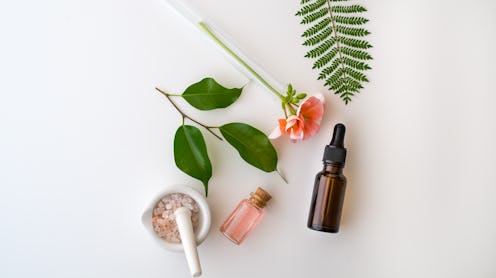(Beauty)
Why Fragrance In Skincare Products Can Cause Acne, Irritation, & More

We all like things that smell good: our homes, our hair, our bodies, and our clothes. But fragrance in skincare is a different story. Lately, the debate about skincare with synthetic fragrance has been more prevalent than ever, with popular brands packing their cleansers, serums, and toners with pleasant aromas despite the long-standing reputation of fragrance being a known irritant. According to dermatologists, it may not be the direct cause of the skin condition, but it can surely make it worse.
If you take a cursory glance at any ingredient list, the perpetrators are typically right in front of you: parfum, perfume, aroma, linalool, citronellol, cinnamal, limonene, geraniol, eugenol, lavandula angustifolia, rose flower extract, citrus bergamia, and cinnamon, just to name a few. "[These ingredients] often connote this sense of luxury and pampering," Dr. Nikhil Dhingra, MD of Spring Street Dermatology in New York City says. "Unfortunately, it can lead to many issues and undo any work you’re putting into your skincare routine." And Dr. Hadley King, MD, FAAD, New York City dermatologist, echoes those sentiments. "The problem with fragrances in skincare is that many of these compounds are common allergens," she says. "So if you're sensitized, products containing these compounds can cause allergic reactions."
It's important to note that skin reactions to fragrance is due to sensitivity, not necessarily acne itself. In short, while it may not be good for the skin, derms wouldn't necessarily say it's the cause. "Fragrances carry a high risk of allergy and irritation, potentially triggering unwanted reactions, itching, swelling, redness, peeling, and breakouts," Dr. Dhingra says. "Contact dermatitis is a reaction of the skin to the things that it comes in contact with, fragrance is high up there on the list of the most common allergens to generate a contact. Beyond that, it can strip the skin of its natural fatty barrier, leading to a higher risk of generating reactions to other potential allergens you might not have been sensitive to before."
That said, excessive fragrance can make acne much harder to manage. "Any comedogenic fragrances can directly contribute to acne by clogging pores," Dr. King says. "But more often, fragrances can contribute to inflammation in sensitized skin. This can cause rashes and irritation of the skin, and can make break outs more difficult to treat." And if you do by chance have a reaction to fragrance, Dr. Dhingra doesn't suggest over-treating. "I’ve had many patients who have developed sensitivity to fragrance containing products," he says. "Then in an attempt to soothe it, they used thick clogging creams, ointments, oils, or even over-the-counter cortisone creams, all of which can exacerbate acne. Avoidance of that stripping and drying trigger is going to be the best way to avoid this additive buildup of problematic products."
If you do, however, find yourself with a reaction to fragranced products, experts suggest stripping down your routine to solely a gentle cleanser and moisturizer such as CeraVe for at least a week. The break from irritating products will help rebuild the skin's moisture barrier and reduce inflammation.
In a small glimmer of hope, the experts insist that fragrance won't always trigger a negative reaction. However, they still wouldn't suggest using it frequently. "If you are not sensitized to a particular fragrance then it can be fine to use products with this ingredient," Dr. King says. "But keep in mind that your skin could become sensitized. Sensitization can occur at any time, so just because your skin hasn't reacted to a particular fragrance in the past, does not mean that it won't react to it at some point."
Dr. Dingha insists that you know your skin's tolerance before giving any fragranced skincare a try. "If you have heartier skin that can handle more than those with sensitive skin, you can give perfumed products a trial," he says. However, he insists that most of the scents are derived from alcohol, which can trigger further stripping of the skin. "This can heighten your sensitivity to other products as well by disrupting that protective layer. If there’s a fragrance free alternative, it’d still be my preference. If you can absolutely avoid fragrances in your skincare, please try. It’ll save you a ton of frustration in the long run."
We only include products that have been independently selected by The Zoe Report’s editorial team. However, we may receive a portion of sales if you purchase a product through a link in this article.
This article was originally published on